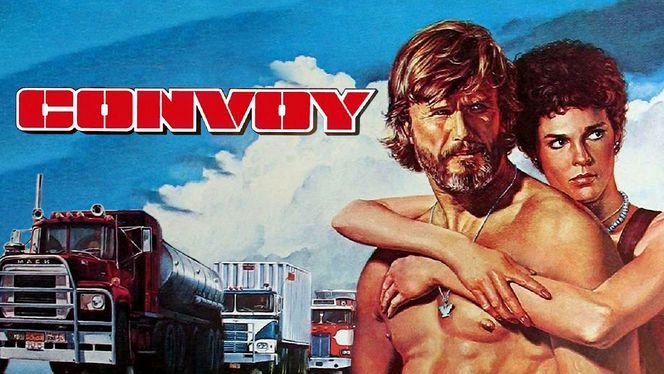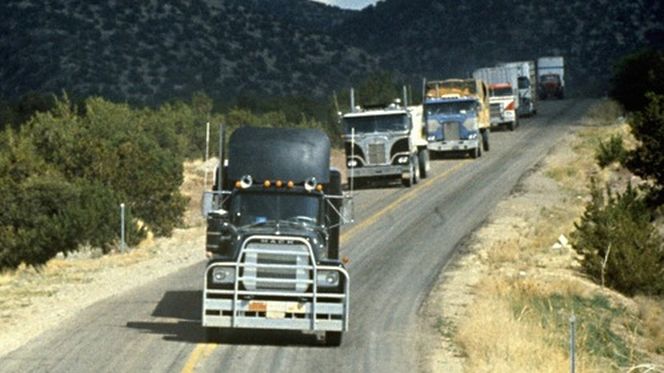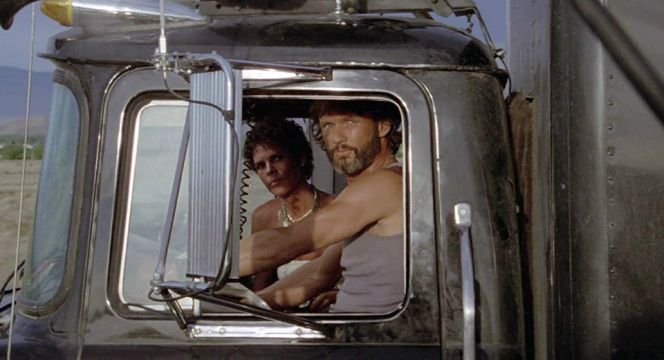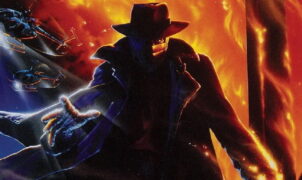RETRO FILM REVIEW – Sam Peckinpah, the controversial director best known for his violent yet melancholic Westerns, ventured into the realm of comedy and politics with Convoy, his 1978 film that has certainly stood the test of time. In light of the recent Canadian Freedom Convoy, Peckinpah’s film showcases the once-thriving art of civil disobedience, seen during the American Revolution, the Civil Rights Movement, and protests against the Vietnam War, but now seemingly forgotten in an era of lockdowns and mandates. With the recent passing of Kris Kristofferson, it feels fitting to reflect on this classic trucker action-comedy.
Convoy is a modern-day Western comedy, where the antagonism between trucker Rubber Duck (Kris Kristofferson) and Arizona Highway Patrol’s Sheriff Lyle (Ernest Borgnine) mirrors the class conflicts between the working class and government elites seen today. However, it also taps into the fundamental Western theme of civilization versus wilderness, good versus evil. The Southwestern story is based on the hit song “Convoy” by C. W. McCall, a country ballad that popularized the CB radio craze—a form of social media long before the Internet. Jonathan Demme’s Citizen’s Band (also known as Handle with Care, 1977) captured the social significance of this phenomenon, but Peckinpah adapted McCall’s exaggerated tale into a mythic battle of American class warfare—truckers versus the autocratic establishment.
Heroes of the Open Road Unite
Working from a script by B. W. L. Norton, Peckinpah revels in America’s cultural diversity, expanding the blockbuster chase-movie concept from Smokey and the Bandit to portray the truckers as a mixed-ethnicity group, offering a reevaluation of the American character—one of the defining traits of the American film renaissance of the 1970s. The cynicism that followed the Civil Rights Movement, the Vietnam War, and Watergate comes through in the truckers’ CB radio complaints as they join Rubber Duck in fleeing from corrupt Sheriff Lyle. They form a mile-long convoy of big rigs rolling across highways and deserts, presenting breathtaking vistas of the American landscape—just as awe-inspiring as when John Ford first sent a stagecoach across Monument Valley.
Peckinpah’s stunning widescreen road vistas evoke the same thrill as the automobile convoys in Spielberg’s The Sugarland Express—another tale of renegades versus authority, but from a time when Hollywood liberalism was still humane. Peckinpah’s nighttime truck-and-paparazzi scenes rival the phantasmagorical world of Fellini’s Roma, yet what truly elevates Convoy is the spirit of collective resistance among the people.
An American road odyssey that celebrates freedom resonates with the mission of Canada’s Freedom Convoy. While corporate media largely blacked out the event, Peckinpah’s poetic action film offers a way to understand this movement better.
The Media’s Authoritarianism
Today’s media tends to favor authoritarianism, while the imagery of protests in the 1960s inspired resistance and empathy. Peckinpah foresaw this distortion, showing in his satire how the convoy attracts the attention of an opportunistic politician (Seymour Cassel) and an East Coast fashion icon (Ali MacGraw), both eager to profit from the “redneck” rebellion—symbolized by the flirtation between MacGraw’s Jaguar XKE and Kristofferson’s Mack truck.
Convoy highlights that the survival of democracy depends on how media manipulates social information—without access to truth and free speech, we cannot communicate our collective rights, individual choices, or common will. Peckinpah’s 1966 film Major Dundee explored the conflicts of the Civil War, while Convoy dissects the modern political nature of social grievances—the truckers’ protest against the 55 mph (“double nickel”) speed limit is, in itself, a political issue.
Peckinpah’s ideology is most clearly expressed in MacGraw’s line: “They’re following you.” To which Rubber Duck replies: “No, they’re not. I’m just in front.” He further explains: “The only reason they’re behind us is because they’ve got no one else to follow.” This is where Convoy truly echoes the Freedom Convoy message, highlighting leadership failures (the forced mandates) by officials in both the U.S. and Canada.
Film culture often romanticizes the uprisings of May ’68 (in both Europe and America), but revisiting Convoy corrects that cultural and political bias. The CB radio discourse serves as an ongoing metaphor for Peckinpah’s unique cinematic expression—a distinctly American aesthetic impulse, captured when a lone trucker joins the caravan, saying: “I heard you broadcasting and figured I’d offer my congratulations.”
A Trucker Hero Who Defies Power
Peckinpah refines his Western romanticism when McCall’s hit is underscored by Merle Haggard’s Okie from Muskogee. It is during this moment that Rubber Duck embarks on a rescue mission, freeing Spider Mike (Franklyn Ajaye), a Black trucker beaten by corrupt cops. Rubber Duck storms the jail in a response to one of the darkest chapters of American history—the lynchings that haunted the pre-Covid era. Yet even Peckinpah’s 1970s Hollywood liberalism is worlds apart from today’s manipulation of race by both government and media.
Peckinpah’s convoy of social and racial liberation culminates in a triumphant blast of truck horns—warnings that the Canadian government has since outlawed, and signals that modern Hollywood no longer understands how to honor. Convoy pays tribute to what civil rights activists once called “good trouble.” It’s a feel-good film about American camaraderie, fighting against injustice and overreaching tyranny. Strangely enough, it’s also a rather relevant film in the context of 2024 Hungary.
-Gergely Herpai “BadSector”-
Convoy
Direction - 8.4
Actors - 8.2
Story - 8.1
Visuals/Music/Sounds/Action - 8.6
Ambience - 8.8
8.4
EXCELLENT
Convoy is an entertaining film that celebrates unity and the fight against injustice—blending trucker action with sharp political satire.


















Leave a Reply